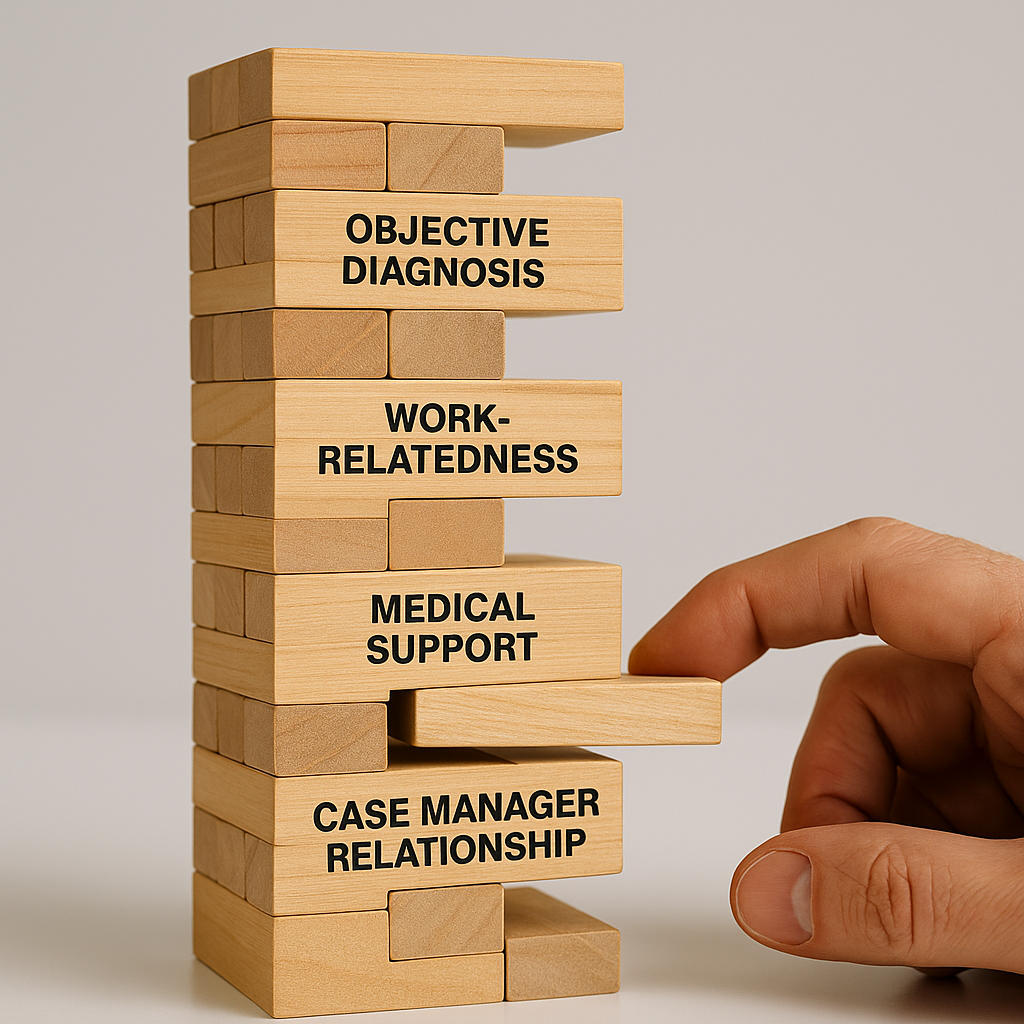You can hate the game, but don’t vent on the player holding the keys to your file.
If you’ve been injured at work, you already know that dealing with the Workers’ Comp is anything but straightforward. For most injured workers, it’s an overwhelming and frustrating process, full of delays, vague communications, and decisions that don’t seem to make sense. You’re in pain, stressed about money, and trying to make sense of a system that feels designed to grind you down.
Eventually, all that frustration tends to zero in on one person: your case manager. Maybe they sounded cold over the phone. Maybe they rejected a treatment you know you need. Maybe they didn’t return your call or follow up when they said they would. It’s natural to start viewing them as the problem—and for many workers, it becomes tempting to vent, to push back hard, or even to go on the offensive.
But if you do, you’ll likely make your own situation worse. No matter how flawed the system may be, and no matter how unfair the process feels, turning your case manager into an adversary almost always backfires.
The Role of the Case Manager
It’s important to understand the role your case manager plays, and how much influence they actually have. Your case manager is not your personal advocate. Their job is to interpret and apply WCB policy to the facts of your case, manage the claim process, and communicate with all the different parties involved i.e., you, your employer, your healthcare providers, and WCB’s internal medical consultants.
That might sound simple on paper, but in reality, they are constantly being pulled in different directions. They’re under pressure from WCB to control costs and ensure that only legitimate claims are approved. At the same time, they’re expected to maintain working relationships with injured workers and employers—who often have opposing interests—and ensure claims move forward according to policy and timelines.
Many case managers are managing well over 100 active claims at once. They’re navigating increasingly complex psychological injuries, working around an overwhelmed healthcare system, meeting internal performance metrics, and trying to keep all sides reasonably satisfied in a system that rarely leaves anyone feeling content.
This doesn’t mean you need to feel sorry for them. But it does mean that if you go to war with your case manager, you’re choosing a battle with someone who is both overworked and—in many cases—capable of quietly making your life more difficult.
Policy Isn’t Always Black and White
What a lot of injured workers don’t understand is that WCB policy is not black and white. Most of the time, there is no simple formula that says “if X, then Y.” Instead, policy is often written in a way that leaves a fair amount of discretion to the person adjudicating your file.
Many policies contain language like “on a balance of probabilities,” “reasonable medical evidence,” “significantly contributed to,” or “where appropriate.” Every one of those phrases calls for subjective interpretation. And that interpretation is made by your case manager.
It’s their job to decide whether your doctor’s opinion is persuasive enough, whether a new assessment is warranted, whether to authorize further treatment, or whether your version of events holds up. These aren’t clear-cut decisions. Often, they involve judgment calls—and those calls tend to go better for workers who have earned a case manager’s trust.
Time and Discretion Are Limited
Judgment and discretion are not just influenced by the evidence, they’re also shaped by time. Case managers are constantly triaging their workload. And in that triage system, the workers who are cooperative, credible, and respectful are much more likely to get attention.
When a case manager has limited time, they prioritize the files that feel manageable. That doesn’t mean they’re consciously punishing you for being upset. But it does mean that if you’ve made their job harder through angry emails, missed calls, or personal accusations, you can expect to fall lower on the priority list.
If your case manager has to choose between a worker who’s calm, communicative, and timely versus a worker who’s combative or emotional, they’re naturally going to spend more time on the file that won’t drain their energy.
What You Don’t See Behind the Scenes
Some of the best things that happen in WCB claims don’t come with a memo. You won’t get an email that says, “We were going to deny this but decided to approve it out of fairness.” You won’t get a phone call saying, “I pulled some strings for you behind the scenes.” But that kind of quiet leniency happens more often than you might think.
A case manager might decide to approve a discretionary benefit. They might follow up with a specialist who hasn’t returned a report. They might extend a benefit window without telling you that you missed a deadline. These are all small decisions that can make a big difference, and you probably won’t even know they happened.
Likewise, if those same discretionary opportunities come up and you’ve built a reputation as combative, disorganized, or threatening, those same decisions will likely go against you. And you won’t know that either.
What Happens When You Burn the Bridge
When a worker crosses the line through aggression, verbal threats, or even just repeated accusations—something shifts in the file. The tone of communication changes. Every interaction gets documented. Every future request gets handled in a strict, policy-only way. And the small, informal graces that might have been extended before suddenly disappear.
At that point, the case manager is no longer trying to help you, they’re protecting themselves. They begin managing your file defensively, which often results in slower communication, tighter interpretations of policy, and little to no discretion applied in your favour.
You may still be able to appeal decisions and fight for outcomes, but everything becomes harder, slower, and more rigid.
How to Disagree Without Making Things Worse
None of this means you need to accept bad decisions. You have the right to push back. But there’s a right way to do it. You can challenge decisions without attacking the person who made them.
The best way to raise concerns is in writing. Stick to facts, use a neutral tone, and focus on the issue and policy—not the individual. For example, instead of saying, “You’ve never cared about my recovery,” you can say, “I don’t agree with the decision to deny physiotherapy, and I’d like to request a formal review.”
This approach keeps the lines of communication open and ensures you maintain credibility. It also increases the odds that your next request will be taken seriously, even if this one wasn’t approved.
Credibility is Currency
In the WCB system, credibility matters more than almost anything else. Case managers write notes about you. Those notes are read by supervisors, medical consultants, return-to-work staff, and sometimes appeals officers. If you’re seen as someone who is honest, responsive, and reasonable—even when frustrated—that impression carries weight.
It can influence how your appeal is viewed. It can affect whether someone follows up on your file. It can be the deciding factor in a discretionary decision.
That doesn’t mean you have to be agreeable all the time. But you do need to be strategic. You want the people reading your file to see a worker who is organized, proactive, and committed to recovery, not someone who has been hostile or unreasonable.
When the Relationship is Too Far Gone
In some cases, the relationship between you and your case manager may already be broken. Maybe communication has deteriorated to the point where nothing productive is happening. Maybe trust is gone. In those situations, continuing to push back personally won’t help. It might even cause further damage.
That’s the point at which you may need a third party to step in. A qualified WCB representative can take over communication, make formal submissions on your behalf, and de-escalate tension. Having someone else involved allows you to reset the dynamic and refocus on outcomes rather than conflict.
Sometimes, simply having a neutral, professional voice advocating for you is enough to get things back on track.
Final Thoughts
The Workers’ Compensation system is far from perfect. It’s often bureaucratic, impersonal, and inflexible. And it’s true that some case managers lack the empathy or attention that injured workers deserve.
But turning them into your enemy rarely makes things better. In most cases, it does the opposite.
Your case manager didn’t design the system, but they’re the person administering it. And whether you realize it or not, their interpretation can be influenced by the credibility and professionalism you bring to the table.
The best outcomes often go to workers who remain respectful, clear, and focused. And yes, be this way even when the process is deeply frustrating. When you lose your cool, you risk losing your voice in the process. And in a system that already limits how much is done for you, alienating the person with the most day-to-day influence over your file is a serious mistake.
You don’t have to like any of this but you need to understand it. You don’t have to be besties with your case manager. Nor do you have to trust the system. But if you can stay strategic and professional—and if needed, get support from someone who knows how to advocate without making things worse—you give yourself a far better shot at success.


